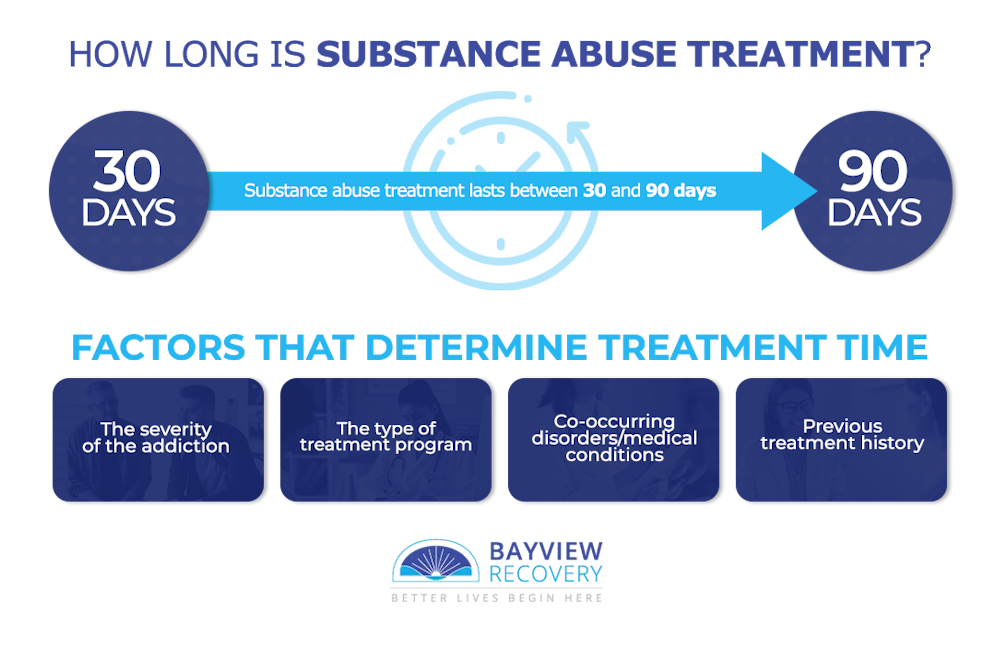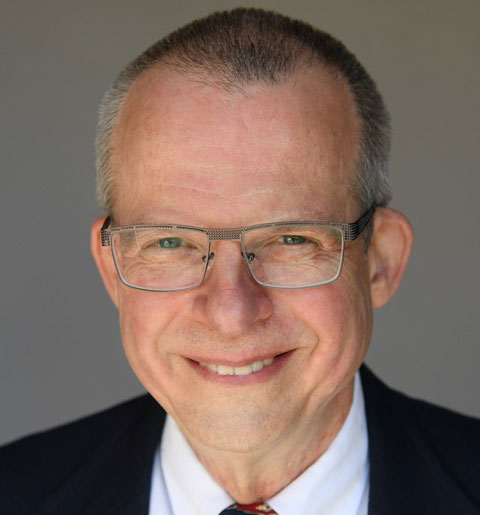How Long is Rehab for Substance Abuse?
The length of treatment for alcohol abuse or drug abuse is highly contingent on the individual seeking treatment. The recovery process looks different for everyone because addiction affects everyone in unique ways. You’ll also notice that many facilities offer a variety of treatment options for this exact reason. While every rehab program has some basic structure, your or a loved one’s treatment stay will look different from another patient’s. The treatment process is individualized to the person and there are many factors that may cause someone to attend different programs or therapies than someone else.
In drug or alcohol addiction treatment, you may start in one program and transition to another. In fact, this is very typically how it works. Recovery is a long-term process, and as you’ll discover it’s a life-long process that for many patients often requires follow-up treatment. This is because addiction is considered a chronic relapsing disease similar to hypertension, asthma, diabetes, and cancer. Research shows individuals who stay involved within the recovery community, and attend rehab for longer durations have the best outcomes.

How Long Can I Expect to be in Substance Abuse Treatment?
The length of substance abuse treatment can vary depending on a variety of factors, including the severity and type of addiction, the individual’s response to treatment, and their personal circumstances. In general, most substance abuse treatment programs last between 30 and 90 days, with some lasting up to a year or more for severe cases. It is important to remember that recovery is a lifelong process and ongoing support may be necessary even after completing a formal treatment program.

What are the Different Types of Drug Addiction Treatment?
Treatment for substance abuse typically falls into two categories, inpatient or outpatient rehab programs. Inpatient means you stay at the facility, while outpatient treatment means you can stay at home during the course of treatment.
What is Inpatient Treatment?
Inpatient rehab is a type of drug addiction treatment that involves staying at a residential facility for a set period of time, typically 30-90 days. During inpatient rehab, patients receive intensive therapy and 24-hour care to help them overcome their addiction. This type of treatment is ideal for those with severe addictions or who have already tried outpatient treatment without success.
Inpatient treatment facilities provide a structured and supportive environment where patients can focus solely on their recovery without the distractions and temptations of everyday life. Patients receive individualized treatment plans tailored to their specific needs, which may include medication-assisted treatment (MAT), behavioral therapy, group therapy, family therapy, and other services.
While inpatient treatment can be more expensive than outpatient treatment, it often provides the best chance for long-term recovery by giving individuals the tools they need to overcome addiction and maintain sobriety over time.
What is Outpatient Treatment?
Outpatient forms of care are types of drug addiction treatment that allow patients to receive therapy and other services while living at home or in a sober living facility. This type of treatment is ideal for those with less severe addictions or who cannot take time away from work or family obligations.
During outpatient drug rehab, patients typically attend therapy sessions several times per week, ranging from individual counseling to group therapy. Treatment plans are tailored to the patient’s specific needs and may include medication-assisted treatment (MAT), behavioral therapy, family therapy, and other services.
Outpatient drug rehab provides a more flexible approach to addiction recovery than inpatient treatment, allowing individuals to continue working or caring for their families while receiving the support they need. However, it may not be as effective for those with severe addictions or co-occurring mental health disorders that require intensive care.
Overall, outpatient treatment can be an effective option for those seeking help for drug addiction who do not require 24-hour supervision and medical care. When it comes to outpatient treatment there are a variety of standard programs that :

This type of treatment is usually a step down from inpatient care. It generally involves intensive daily therapy and lasts for 6 to 12 hours per day, three days a week or more.
Partial hospitalization programs (PHPs) are a type of intensive outpatient care for individuals struggling with mental health disorders, substance abuse, or both. PHPs provide a higher level of care than traditional outpatient programs and are designed to help patients transition from inpatient treatment to living independently.
Intensive outpatient programs are designed for those who need more structure and support than traditional outpatient treatment. Most IOPs meet at least three days a week, offering group therapy sessions, individual counseling, and other services like medical management or educational classes. Patients typically attend the program for 8 to 10 weeks, although some may require longer depending on their particular situation.
Outpatient programs provide scheduled counseling sessions with individual therapists combined with group meetings up to 5 times a week. Standard outpatient programs offer the most flexible level of care providing individuals with the flexibility to seek therapy and other drug abuse programs on their own schedule. This is often a great option for people who need additional support after an IOP, or PHP, or if someone has recently relapsed and needs to get back on track.
The best type of treatment will depend on the individual’s needs and circumstances, and it is often beneficial to combine multiple approaches for the best chance at success in overcoming addiction.
What Determines How Long Rehab Lasts?
The length of rehab typically depends on several factors, including:
- The severity of the addiction
- The type of treatment program
- If the individual suffers from any co-occurring mental health or medical conditions
- If the individual has been through the treatment process previously
In general, more severe addictions may require longer periods of treatment to achieve lasting recovery. Additionally, individuals with co-occurring mental health disorders or other medical conditions may need longer periods of care to address these issues in addition to their addiction.
The type of treatment program can also affect the length of rehab. Inpatient programs typically last between 30 and 90 days, while outpatient rehab can range from a few weeks to several months. Partial hospitalization programs (PHPs) usually last between two and four weeks.
Finally, an individual’s specific needs and circumstances play a significant role in determining how long rehab lasts. Some individuals may respond better to short-term programs, while others may benefit from long-term treatment that includes ongoing support to maintain long-term sobriety.
Ultimately, the goal of rehab is not just to achieve short-term sobriety but to help individuals build a foundation for lasting recovery. This often requires ongoing support even after completing a formal treatment program.
How Do 30, 60, and 90-Day Programs Work?
30, 60, and 90-day programs are types of addiction treatment programs that are designed to help individuals overcome substance use disorder and achieve positive outcomes. These programs provide structure and support in an environment where individuals can focus on their recovery without the distractions and triggers of everyday life.
In general, these programs follow a similar structure but vary in terms of the length of time spent in treatment. Here is a breakdown of how each program typically works:
- 30-day program: This is the shortest type of inpatient or outpatient rehab and is often used for individuals with milder addictions or as a first step toward longer-term treatment. During this program, patients receive intensive therapy, participate in group counseling sessions, and may undergo detox if attending inpatient rehab.
- 60-day program: This type of program provides more time for patients to focus on their recovery and address any underlying issues that may be contributing to their addiction. Patients receive the same level of care as those in a 30-day program but have additional time to work through personal issues and develop coping skills.
- 90-day program: This is the longest type of program for treating addiction and is often recommended for individuals with severe addictions or underlying issues like mental illness. During this extended period, patients have more time to work on personal issues, develop healthy habits, and build a strong foundation for their lifelong journey in recovery.
When considering how long is rehab, remember all rehab programs aim to provide patients with the tools they need to overcome addiction after leaving formal treatment. This may include continuing therapeutic treatments and participating in support groups like AA or NA, or other forms of aftercare support.
What are the Advantages of Enrolling in Longer Term Addiction Treatment?
There are several advantages to enrolling in longer-term addiction treatment programs, including:
- Greater chance of successful recovery: Research has shown that individuals who participate in longer-term treatment programs have a higher likelihood of achieving long-term sobriety compared to those who only receive shorter-term care.
- More time to address underlying issues: Addiction is often accompanied by underlying mental health disorders or trauma that need to be addressed for lasting recovery. Longer-term treatment programs provide individuals with more time and resources to work through these issues and develop healthy coping mechanisms.
- Opportunity for personal growth: Longer-term treatment programs provide individuals with the opportunity to focus on personal growth and development. Patients can learn new skills, develop healthy habits, and build strong support networks that can help them maintain sobriety after leaving formal treatment.
- Reduced risk of relapse: Longer-term treatment programs often include ongoing support and aftercare services that can provide patients with relapse prevention techniques to utilize after leaving formal treatment. This may include participation in support groups like AA or NA, continuing counseling sessions, or other forms of ongoing care.
Overall, enrolling in a longer-term addiction treatment program provides individuals with a greater chance of maintaining sobriety and building a fulfilling life free from addiction.
Recovery From Addiction at Bayview in Washington State
When it comes to how long is rehab, it does not have a one-size-fits-all answer. The average length can range from 7 days to 90 days or longer and each length of stay has its benefits. To determine how long you or a loved one should attend a rehab program you should reach out to a qualified treatment team like ours at Bayview Recovery.
Overcoming substance use disorders requires dedication along with experienced and trained professionals that understand this chronic disease. Contact Bayview Recovery today to learn more about treatment at our addiction center.

“The staff at the center has been remarkable in their care for our loved one. Tuni was with us the whole way as we tried to get this person into treatment. They continue to assist us as the process continues. Great work!”
Ray O
“I have been trying to get sober the past 3 years and I have been to treatment 5 times. Bayview Recovery was my 6th time. They helped me get to 142 days sober! I was a handful hot mess when I got there but the team never gave up on me. They work with families and they truly care about them too. Bayview house’s are clean and comfortable and the staff is amazing. They plan for fun events weekly and they want you to have fun. If your looking for something different call them it will save your LIFE!”
Cindy J
“Bayview is dedicated to providing clients the healthiest environment to develop a solid foundation in their recovery. The therapists and medical team are devoted to ensure clients have the best individualized care. I highly recommend Bayview for anyone seeking a highly professional treatment program. The care and compassion given to clients is remarkable.”
Robin M
“This is a fantastic facility with outstanding staff. If you or a loved one is struggling this is a great program to start the journey of recovery and get life long skills and relationships to begin a new life!”
Garrett T
“Just picked up our daughter after 90 days at Bayview Recovery. Loved the staff and facility, do not know what the future holds ???????? but while at Bayview , always felt informed. Highly recommend, incredibly helpful especially at the very beginning when we were so helpless and needed help the most – God Bless.”
Rosie S
Dave Cundiff, MD, MPH is an experienced leader in the field of Substance Use Disorder treatment. He works with patients suffering from Substance Use Disorder to evaluate their medication needs and prescribe treatments accordingly. In addition, he regularly participates in all-staff debriefing sessions involving peers, nurses, and other prescribers. He also reviews and advises on policies, procedures, and techniques for treating substance use disorder.




